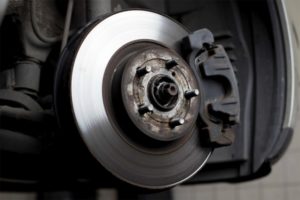
Unusual brake noise or braking behaviors should serve as a warning that one of the most essential systems on your car is malfunctioning. It’s all too common for drivers to ignore minor brake noises or irregularities for too long. Eventually you may end up in a situation where your car requires a repair that is much more expensive than it would have been otherwise. Even worse, the car is unable to stop in an emergency situation, causing an accident that could have been avoided. However, automotive brakes have a hard job. They are exposed to tremendous forces and generate a lot of heat every time you stop your car. When you press on the brake, all the energy that your car creates by moving down the road has to be converted to heat through friction. The amount of friction created by stopping even a mid-size car from freeway speeds is enough to make the brakes red-hot. The pounding that your brakes have to go through each time you use them to slow down means they may make noise or occasionally behave abnormally, even though nothing is wrong. Here is a summary of common brake noises and behaviors which are abnormal – some are OK, and others may make your car unsafe.
Rattle
Brake rattle is a common concern for drivers. Most often brake rattle happens when you let up off the pedal. Suddenly you may hear a rattle. Usually it sounds like the rattle made when shaking a can of spray paint. The most common cause of this noise is the pads, and that’s ok. Brake pads can rattle sometimes due to heat expansion, especially if they were installed without anti-rattle shims. Keep in mind that this rattle should not be consistent and it should never happen while you have your foot on the brake pedal. Under either of those conditions, you should have your brakes checked. It could be the sign of a more serious problem.
Brake Grinding
Brake grinding is always a serious problem, and should be dealt with immediately. There are 2 major causes of brake grinding. When your brakes are making a loud grinding sound when you press on the pedal, this is almost always caused by contact of the rotor disc with part of the caliper. This is usually because of extreme wear to the brake pads or rotors. If you wait until your brakes grind before servicing them, you’ll be in a worse situation. They will require a much more expensive repair. Another reason that brakes may make a grinding sound is when a foreign object (such as a stone) gets lodged somewhere in the caliper. When this happens, the brakes will usually make a consistent grinding or screeching sound when the vehicle is in motion. You can try to work the object free yourself by moving the car forward and backward repeatedly in a safe place, but if that doesn’t remedy the problem, you’re going to have to have the brakes serviced. A foreign object in the brake mechanism can cause expensive damage.
Brake Fade
“Brake fade” is a condition where the brakes have become overheated, and they don’t function normally as a result. Brake fade is most common in situations where the brakes are being used much more than they usually would, such as going down a long hill. When you experience brake fade, the pedal will require extra effort to yield the same stopping power. One way to prevent brake fade is by using “engine braking” techniques. Use the lower gear functions on your transmission so that the vehicle’s engine and drivetrain controls the vehicle’s speed. In extreme cases, the safest option is to pull over the vehicle and wait for the brakes to cool. If you think you are experiencing brake fade, you should always perform a pressure check on your braking system to make sure that the hydraulics on your brakes are working correctly. You can do a hydraulic check by pumping the pedal a few times when your car is parked. The pedal should become increasingly firm with each pump, without feeling mushy.
SOURCE: carsdirect
